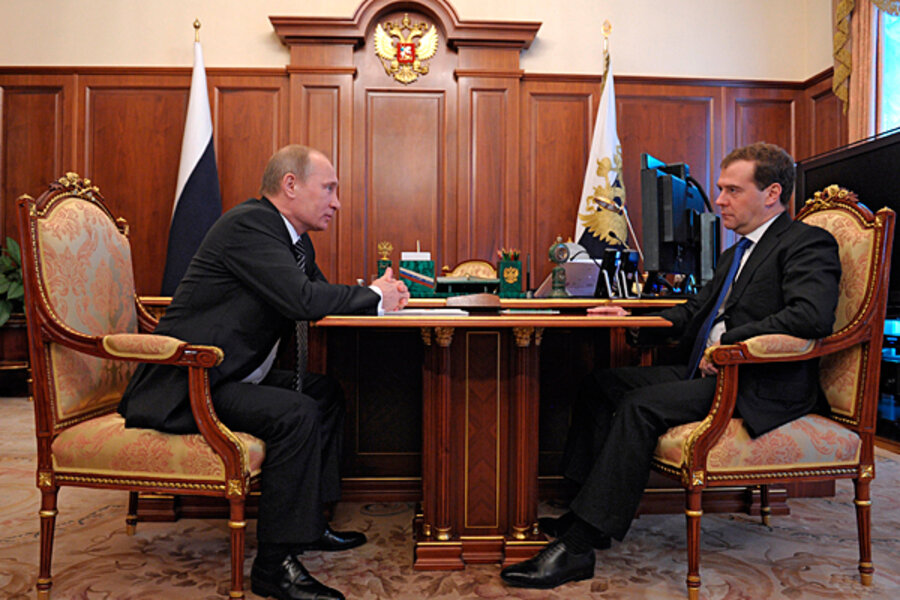New Russian cabinet packed with Putin loyalists
Loading...
| Moscow
There's a new government in Moscow, and a new Kremlin administration as well. It may take observers some time to master everyone's new job titles, but the officials are mostly familiar faces and proven loyalists of freshly-inaugurated President Vladimir Putin.
Though Mr. Putin has moved over from his former job as prime minister in the White House, where the Cabinet sits, to the presidential office in the Kremlin, the overwhelming message from his blizzard of official appointments yesterday and today is one of continuity. The leader who has effectively run Russia for the past twelve years with a detail-obsessed, hands-on managerial style plans to keep things that way.
Outgoing president and new prime minister Dmitry Medvedev, whose four-year tenure in the Kremlin was overshadowed by Putin at every step, will find himself equally hemmed in at his new office in the White House, experts say.
"The new government will depend entirely on Putin, its center will be in the Kremlin and all the key people will be there," says Dmitry Oreshkin, head of the Mercator Group, a Moscow political consultancy. "People of Putin's age and circle will determine Russian politics for the next few years, while the younger generation represented by Medvedev will have fewer plenary powers, will not be independent and will have narrow perspectives for their activity."
Yesterday the Kremlin announced the new cabinet lineup. It included few fresh faces, despite Mr. Medvedev's earlier promises of "substantial renewal" in the government he is set to lead.
Most of the key "power ministries" will remain in familiar hands. They include Foreign Minister Sergei Lavrov, who has proven to be a skillful advocate for Russian policy amid turmoil in the Middle East and acrimony with the West over issues like missile defense.
Also returning is Defense Minister Anatoly Serdyukov, who oversaw a sweeping organizational reform of Russia's armed forces and will now be tasked with implementing Putin's ambitious, nearly $1 trillion plan to modernize the military with new weaponry
The unpopular interior minister, Rashid Nurgaliyev, who has faced severe criticism over corruption in police ranks and other abuses in law enforcement, has been given a new job in the Kremlin's Security Council. He will be replaced as minister by Moscow Police Chief Vladimir Kolokoltsev, who won Putin's approval with his efficient handling of mass protests that have rocked the Russian capital over the past few months.
Another Putin loyalist, First Deputy Prime Minister Igor Shuvalov, will remain in his central position despite a controversy over his personal wealth kicked up by anti-corruption blogger Alexei Navalny in March.
Many of those removed from Putin's old cabinet will find new jobs in the Kremlin, it was announced today. They include at least four unpopular former ministers who have now been handed key jobs as Kremlin aides and advisers, such as Mr. Nurgaliev and former Transport Minister Igor Levitin, who earned the sobriquet "Minister of Catastrophe" for all of the airline disasters, boat sinkings, and other transportation mishaps that have occurred on his watch.
"The clear message from all these new appointments is that there will be no new Putin, as many people had hoped for," says Mikhail Kasyanov, who was Putin's prime minister during his first term, 2000 to 2004, and now heads a liberal opposition party, PARNAS.
"There was a feeling that Putin had learned a lesson from the wave of protests, and would bring on reforms. But the new cabinet does not contain any people with ideas of their own; it's made up of technocrats who will take their instructions from the Kremlin. Putin has moved all his strongest loyalists into the Kremlin, and they will be the ones to formulate those instructions," Mr. Kasyanov says.
"In fact, Putin will continue in both capacities (president and prime minister) as he has all along. He doesn't want to change anything; he believes everything is under control and he'll always have enough money to feed people with, so he need not risk reforms. But serious problems are on the horizon, and within a couple of years the situation may change cardinally," he adds.






